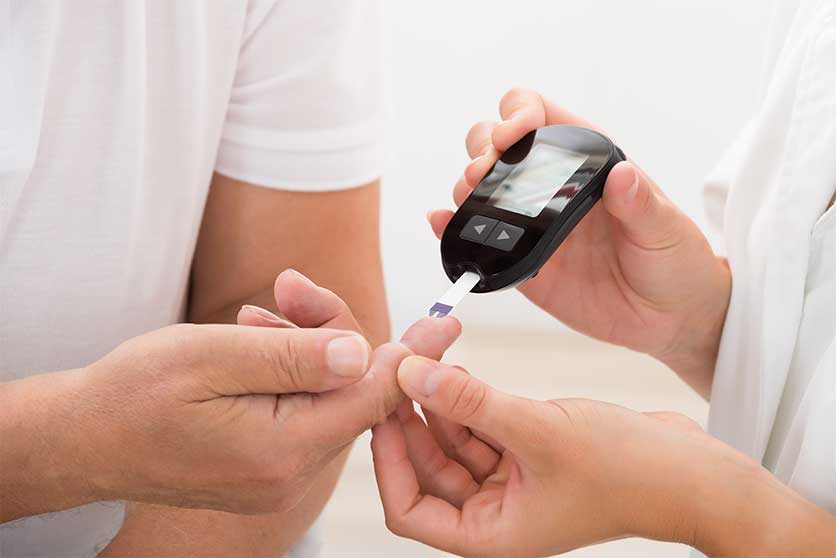Can Those With Diabetes Attend Inpatient Drug Rehab?
Patients with diabetes can attend inpatient rehab. During inpatient rehab, patients may receive both diabetes and addiction treatment services, including eating healthy foods, monitoring blood sugar levels, attending therapy sessions, and taking medication.

Yes, people with diabetes can attend inpatient drug rehab programs. Diabetes care services you can get in a treatment program can include blood glucose monitoring, following a diabetes diet, and consulting specialty healthcare providers such as endocrinologists and dietitians.
In Ohio, over 1 million adults have either type 2 or type 1 diabetes. Hundreds of thousands of Ohioans may have a substance use disorder (SUD). Having either diabetes or an SUD can increase your risk of having the other condition.
Before entering an addiction treatment program, you can ask your treatment provider about the diabetes management services they offer. Talking to your doctor or calling a national helpline can give you a referral to an addiction treatment center that works for you.
Treatment Options For Rehab Patients With Diabetes
Many patients with diabetes need additional support and care. This is because diabetes is a chronic health problem. Untreated diabetes can lead to complications such as eye problems, nerve damage, kidney problems, heart disease, and an increased risk of heart attack.
Patients with diabetes may need to watch and maintain their blood sugar levels constantly. Many types of diabetes care options include changes to your diet. Diabetes treatment options you may receive in rehab depend on your specific condition, but can include:
- taking blood tests several times per day
- wearing a continuous glucose monitor
- taking a type of insulin dose with pens or insulin pumps
- taking other diabetes medications such as metformin
- eating foods with less carbohydrates and cholesterol
- adding fruits, vegetables, and other healthy eating options to your diet
- attending wellness programs, such as daily physical activity programs
- general lifestyle changes
In an inpatient rehab program, you may receive diabetes care at the same time as therapy, detox programs, and other addiction treatment options. Your treatment provider can make sure your diabetes medications and addiction treatment do not interact.
Risk Factors For Patients With Diabetes & Substance Use Disorders
If you or a loved one have diabetes, managing your diabetes is crucial during your inpatient treatment program. Some types of drug or alcohol abuse can trigger diabetes symptoms. Substances that can trigger diabetes symptoms may include:
- alcohol
- methamphetamine
- ecstasy or MDMA
- cocaine
- ketamine
These substances can make you more resistant to insulin, change your blood glucose levels, or cause problems with the pancreas. These health conditions can make treating diabetes more difficult.
Abusing certain substances, such as nicotine, opioids, or amphetamines can increase your risk of type 2 diabetes. When you are entering a substance abuse treatment program, you may be asked about your family history of diabetes.
If your risk is high, you may take blood tests to see if you have prediabetes.
Acute Diabetic Episodes
Excessive drinking can increase your risk of hyperglycemia and hypoglycemia. These episodes are caused by extremely high blood sugar levels and extremely low blood sugar levels, respectively.
Hyperglycemia can cause excessive urination, excessive thirst, and blurry vision. It can also cause diabetic ketoacidosis, a condition where ketones reach your bloodstream. High levels of ketones in your bloodstream can be dangerous.
Hypoglycemia can cause side effects such as tremors, changes in blood pressure, weakness, confusion, and lethargy. Hypoglycemic episodes can sometimes be managed by quickly eating sugary foods, such as candy. If left untreated, these episodes can be life-threatening.
Ohio Recovery Center
Living with diabetes and a substance use disorder can be difficult. If you are thinking about entering an addiction treatment program, you may be worried about your diabetes as well.
For an addiction treatment program that can treat multiple health conditions, please contact Ohio Recovery Center.
Our addiction treatment services include medical detox programs, medication-assisted treatment, wellness programs, and lifestyle coaching. We can treat patients with a variety of needs and conditions, including those with diabetes.
- American Diabetes Association https://diabetes.org/health-wellness/substance-use
- Centers for Disease Control and Prevention https://www.cdc.gov/diabetes/managing/index.html
- Medical Care https://www.ncbi.nlm.nih.gov/pmc/articles/PMC8446308/
- National Institute of Diabetes and Digestive and Kidney Diseases https://www.niddk.nih.gov/health-information/diabetes/overview/managing-diabetes
- Substance Abuse and Mental Health Services Administration https://store.samhsa.gov/sites/default/files/d7/priv/sma13-4780.pdf

